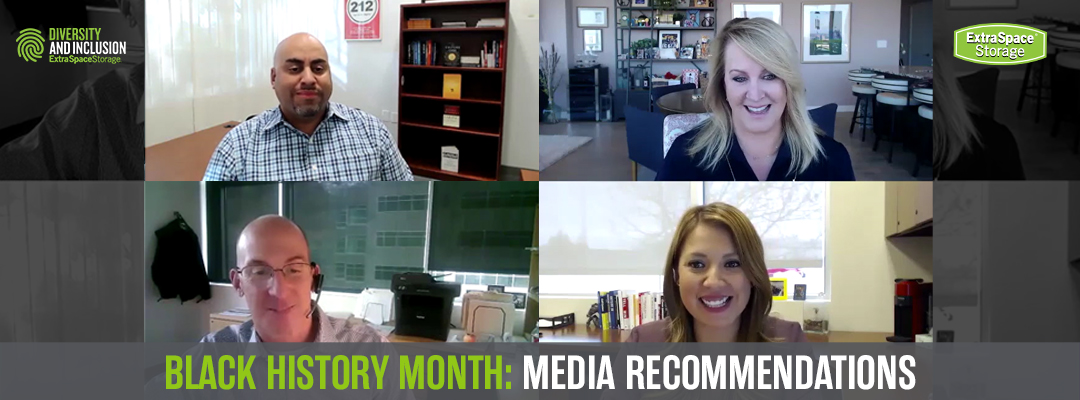justFebruary is Black History Month, a time to remember and celebrate Black Americans’ central role in U.S. history and shed light on racial equality. In a June 2020 statement to Extra Space Storage employees, CEO Joe Margolis said, “Our commitment to help people to a better tomorrow includes helping create a more diverse and inclusive workplace today.”
Recently, to announce new Extra Space Storage Diversity & Inclusion subcommittees, Margolis spoke with committee members about their experiences with diversity and inclusion in the workplace. Participating in the discussion were:
- Rashede Peoples, Senior Vice President of Operations West
- Karen Pierce, Division Vice President
- Monica Ruedas, Director of the National Sales Center
Below is a video clip and highlights from a question Margolis asked the group, “Do you have a recommendation of a movie, book, article, or another piece of media that people may want to consider to help them see and understand different perspectives?”
Peoples: There’s a brief TED Talk that inspired me titled “What It Takes to Be Racially Literate.” I think it’s a great starting point and provides a fresh perspective on the topic of race.
Pierce: I read a book last year called Between the World and Me by Ta-Nehisi Coates. It’s a 100-page essay written for the author’s four-year-old son about what it’s like to grow up in America as a person of color. One point that stood out to me was that white privilege doesn’t mean your life hasn’t been hard. It means that your life hasn’t been made harder because of the color of your skin. I would encourage anybody who wants to know more about that to pick up this book. It’s an easy read and well written.
Ruedas: From National Geographic Documentary Films, watch LA 92 (which is available on Netflix). I was raised in Los Angeles, so it’s really close to home for me. I grew up in the city of Watts and riots happened right there, South Central LA, and that area. The film shows how a community comes together to demand equal rights. But it also shows the destruction that took place in these communities. It can be hard to watch, but it’s a reality of what has taken place in the past and also what we saw with riots not so long ago. My family owns a small business that was completely burned down—they lost everything. Through all of these things that happen, you become guarded and scared of what’s possibly going to happen. By being more knowledgeable and educating ourselves on the benefits of diversity and how we can respect each other, hopefully, things like this won’t need to happen in the future.
To close out the discussion, Margolis added his suggestion, a Netflix film titled 13th: “It’s about the 13th Amendment and specifically about how the 13th Amendment outlawed slavery but had an exception if you were convicted of a crime. It shows how that exception in the 13th Amendment was one of the factors that led to racial injustice today and specifically the mass incarceration that we see, primarily of people of color.”
The Extra Space Storage Diversity & Inclusion committee reached out to additional committee members this month, asking them to share more media suggestions to continue the discussion around racial equality and Black American history.
Anastasia Krecklow, Store Manager: The PBS documentary, The African Americans: Many Rivers to Cross series helped open my eyes to the oppression that Black Americans have endured in the United States.
David Wiehe, Senior Manager of Accounting: I recommend this PBS NewsHour video that I recently watched. It’s focused on two students and their life experiences in a segment NewsHour refers to as “brief but spectacular.”
Paty Portilla, Senior District Manager: I recommend The Nickel Boys: A Novel by Colson Whitehead. It’s heartbreaking and harrowing. While this book is fiction, it’s based on a real school for boys and the horrors of the Jim Crow era. Another recommendation is Heavy: An American Memoir by Kiese Laymon. This memoir broke my heart, helped open my eyes, and moved me to tears. Finally, Just Mercy: A Story of Justice and Redemption by Bryan Stevenson. A powerful and inspiring book that completely changed my perception of justice and my view on the death penalty.
Brian Whitham, Division Vice President: Stamped from the Beginning: The Definitive History of Racist Ideas in America by Ibram X. Kendi. Kendi is probably one of the best writers I am aware of right now. This book breaks down how racism is intertwined in American history.
Brooke Stencil, Senior Director of Digital Marketing: The film Just Mercy is another way to consume Bryan Stevenson’s story and his admirable efforts to help those wrongly convicted and establish the Equal Justice Initiative. The Vanishing Half: A Novel by Brit Bennett is a thought-provoking, fictional story around the Black experience in America. Also, Ibram X. Kendi’s article titled “Who Gets to Be Afraid in America?” was a powerful read about the fear, that especially Black men have, to live within today’s America.
Jeffrey Craig, Facilities Manager: Uncle Tom’s Cabin by Harriet Beecher Stowe. The lesson of Stowe’s story, although fictional, is valuable.

